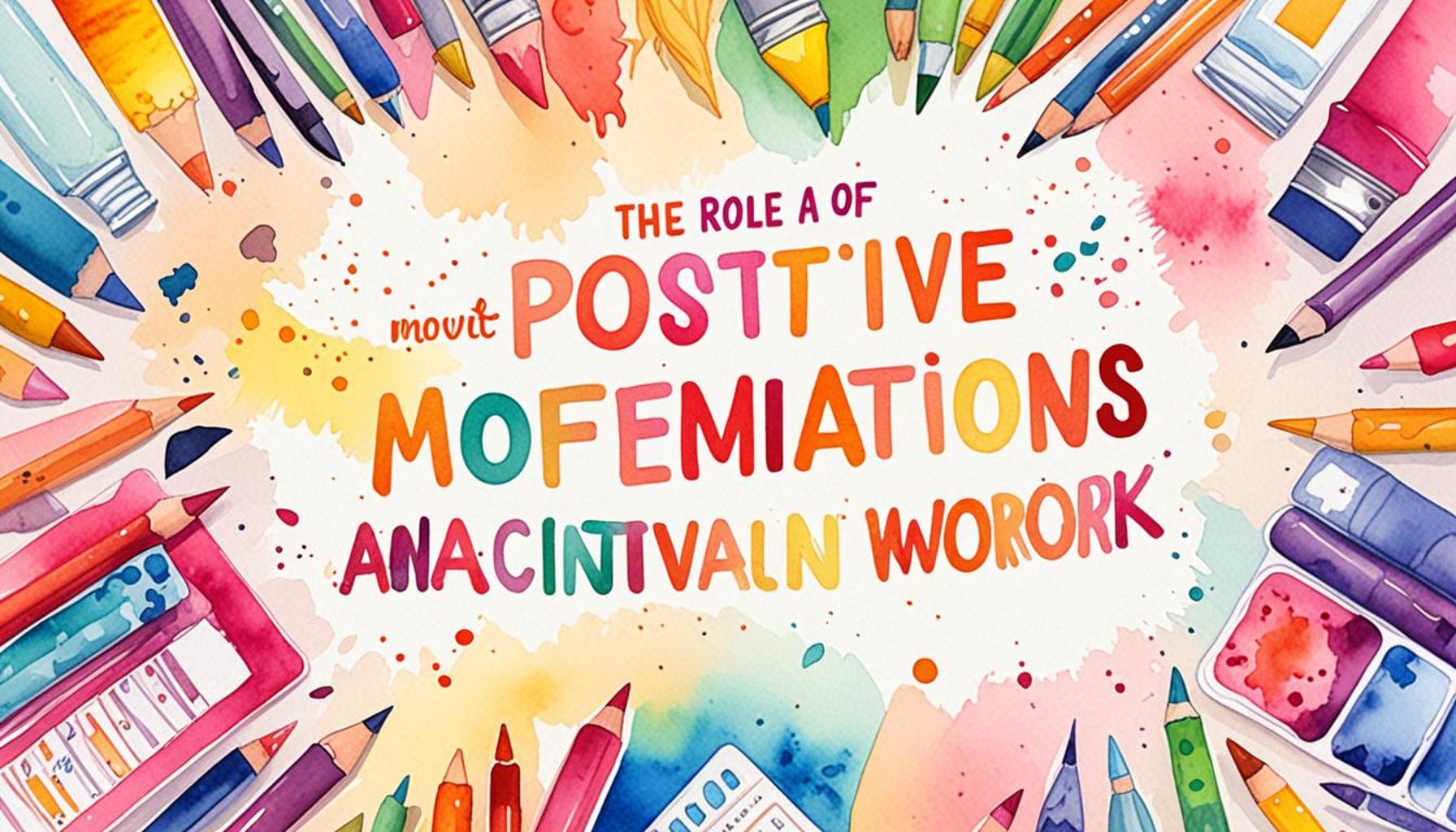How Positive Affirmations Can Transform Your Mindset and Reduce Stress

The Transformative Power of Words
In today’s fast-paced world, stress has become a common part of life for many Nigerians, driven by factors such as economic challenges and the relentless hustle of urban living. However, a simple yet impactful tool can assist in combatting anxiety and promoting mental well-being: positive affirmations. These are concise, uplifting statements designed to reinforce a positive self-image and foster emotional resilience.
Research shows that the use of positive affirmations can lead to noteworthy improvements in mindset and emotional health. Various psychological studies demonstrate that when individuals engage in positive self-talk, they can change longstanding beliefs and cultivate a more optimistic outlook. Here are some key benefits that affirmations can offer:
- Enhances self-esteem: Regularly affirming one’s strengths and capabilities can significantly elevate confidence levels. For instance, saying “I am worthy of love and respect” helps individuals internalize this belief, potentially transforming how they interact with others.
- Reduces stress: By promoting a positive mindset, affirmations aid in managing stress-related symptoms. In a bustling environment like Lagos, where daily challenges abound, affirmations such as “I am calm and in control” can help individuals reclaim peace in their daily lives.
- Improves focus: Positive affirmations can guide your thoughts towards constructive themes, keeping distractions at bay. Statements like “I am skilled and focused on my goals” can enhance productivity, particularly for students or professionals facing demanding tasks.
For example, incorporating daily affirmations such as “I am capable of handling challenges” or “I attract positivity into my life” can create a ripple effect, gradually reducing negative thoughts and anxiety. In high-pressure environments, these affirmations can serve as grounding reminders, helping individuals maintain composure during stressful moments.
Moreover, the practice of repeating affirmations fosters resilience against societal pressures, leading to improved mental clarity. In Nigerian culture, where communal expectations can weigh heavily, affirmations empower individuals to carve their own paths without being hindered by external judgments. As you explore the idea of positive affirmations, consider how incorporating them into your daily routine could lead to lasting change. Whether it’s through morning rituals, journaling, or simply reciting them during commutes, you can harness the profound potential of your words to foster personal growth and wellness.
YOU MAY ALSO LIKE: Read read another article

The Science Behind Positive Affirmations
The efficacy of positive affirmations is rooted in the principles of cognitive psychology, which suggests that our thoughts significantly influence our emotions and behaviors. This relationship forms the foundation for understanding how positive affirmations can effectively transform not just your mindset, but also your overall well-being. By consciously choosing to redirect negative thinking patterns towards affirming beliefs, individuals can create a new inner dialogue that promotes self-acceptance and resilience.
One of the key mechanisms at play here is neuroplasticity—the brain’s ability to reorganize itself by forming new neural connections. Through repetition of positive affirmations, you can actually begin to rewire your brain, leading to a shift in how you perceive challenges and stressors. For example, a person may regularly affirm, “I am strong and capable,” which reinforces a positive belief that can help them push through difficult circumstances, be it in a high-pressure job or while navigating personal struggles.
Moreover, the physiological effects of stress on the body are well-documented. When stress overwhelms the body, it triggers a release of cortisol, a hormone that can lead to various health issues if left unchecked. In contrast, utilizing affirmations can help lower cortisol levels, thereby mitigating these harmful effects. For instance, stating, “I am surrounded by support and love” during times of uncertainty can not only boost mental health but also improve physical well-being.
- Boosts Emotional Well-being: Consistent use of affirmations helps to build a shield against negative emotions. For example, saying “I choose happiness” can help diminish feelings of sadness or anxiety.
- Fosters a Growth Mindset: Affirmations encourage the belief that you can develop your abilities. Phrases such as “I embrace challenges as opportunities for growth” cultivate resilience, allowing individuals to view obstacles as stepping stones rather than roadblocks.
- Promotes Mindfulness: Incorporating affirmations into daily routines encourages greater self-reflection and mindfulness. By acknowledging one’s strengths through statements like “I appreciate my journey,” individuals can become more present in their experiences, decreasing overall stress.
It is also essential to note that while positive affirmations can be a powerful tool, they work best when paired with actionable steps towards personal goals. Setting realistic objectives alongside affirmations provides a structured approach to achieving desired outcomes, thus reducing feelings of overwhelm that are often associated with stress. For instance, a student might affirm, “I am capable of understanding complex subjects,” while simultaneously developing study plans to tackle difficult topics.
As you delve deeper into the practice of positive affirmations, consider varying your affirmations based on your needs and circumstances. In Nigeria, where values of community and resilience are strong, sharing affirmations within social circles can create collective strength. Whether you choose to whisper affirmations during quiet moments or boldly declare them among friends, the potential for transformation lies within your grasp. Embracing this practice not only cultivates a positive mindset but also builds a sanctuary of peace amid life’s chaos.
| Advantage | Explanation |
|---|---|
| Increased Self-Esteem | Positive affirmations encourage self-acceptance, promoting a healthier self-image. |
| Stress Reduction | Affirmations can decrease cortisol levels, leading to a more relaxed mind. |
| Enhanced Focus | By repeating affirmations, individuals can sharpen their focus on goals and intentions. |
| Expanded Creativity | A positive mindset fosters creativity, making it easier to generate new ideas and solutions. |
Affirmations serve as a powerful tool for mental transformation. When practiced regularly, they help to reshape the neural pathways in our brain, leading to a shift in perceptions and attitudes. The result is an empowered individual capable of tackling challenges with a newfound resilience. Research supports that those who engage in positive self-talk are not only able to mitigate daily stressors more effectively but are also prone to exhibit enhanced emotional intelligence. Through the subtle yet profound impact of positive affirmations, individuals might find themselves cultivating a more optimistic outlook on life, which is crucial for both personal and professional growth. This transformative practice opens doors to self-discovery and fulfillment, allowing individuals to embrace their true potential.
CHECK OUT: Click here to explore more
Practical Applications of Positive Affirmations
Implementing positive affirmations into daily life requires consistency and a tailored approach. To maximize their effect, individuals should consider integrating affirmations into their existing routines. For instance, during morning rituals, take a moment to stand in front of the mirror and confidently declare, “I am worthy of success and happiness.” Such affirmations can set a positive tone for the day ahead, gradually shifting one’s mindset and reducing stress levels with each repetition.
Another effective strategy is journaling affirmations. Keeping a dedicated journal where you write down affirmations can create a deeply personal space for reflection. This can be especially beneficial in the Nigerian context, where storytelling is a traditional method of communication. By penning down statements like, “I thrive in challenging situations,” individuals can engage with their emotions on a deeper level, fostering a sense of empowerment as they document progress over time.
Incorporating affirmations into the workplace can also yield positive results. A supportive work environment can benefit not just from task-oriented goals but also from collaborative affirmations. For instance, teams can come together for a brief morning affirmation session, where they collectively state phrases like “We achieve greatness together.” This group-focused approach can enhance camaraderie, reduce workplace stress, and create a more resilient workforce.
- Emphasizing Personal Growth: Integrating affirmations that focus on personal development can encourage continuous learning and adaptability. Statements such as “I am open to change and growth” build a foundation for resilience against life’s uncertainties.
- Cultural Relevance: In Nigeria, drawing on cultural proverbs or sayings can enhance the relevance of affirmations. For example, using the phrase “Nothing is impossible” not only resonates with local wisdom but also deepens the connection between cultural identity and personal belief.
- Utilizing Technology: Today’s digital landscape offers platforms and applications where users can receive daily affirmations. Leveraging these tools can serve as reminders to practice positivity throughout busy days, making stress management more accessible in our fast-paced environments.
Engaging with local communities can further amplify the transformative power of affirmations. Participating in group workshops or self-help sessions where positive affirmations are shared can create a sense of belonging. In many Nigerian communities, the support of collective wisdom often amplifies individual affirmations. By sharing experiences and affirmations like “My efforts lead to success,” individuals not only uplift themselves but also inspire those around them, creating a supportive network that alleviates stress.
As affirmations become more familiar, they can evolve too. Personalization is key; consider creating unique affirmations that reflect individual experiences. Phrases such as “I am strong like the baobab tree” can draw inspiration from the resilience found in nature and evoke local symbolism, enabling deeper emotional connections. This unique approach fosters a sense of pride while promoting positive thinking that is both personal and culturally relevant.
Ultimately, positive affirmations are not just simple phrases; they are powerful tools that can reshape perceptions and cultivate an overall sense of well-being. By exploring practical applications and relating them to cultural identities, individuals can create a nurturing environment wherein stress becomes more manageable, paving the way towards a more fulfilling life.
YOU MAY ALSO LIKE: Read read another article
Conclusion
In a world where stress and negativity can feel overwhelming, positive affirmations stand out as a beacon of hope. By consciously choosing to integrate affirmations into our daily routines, we can profoundly transform our mindset and enhance our overall well-being. These simple yet powerful phrases empower individuals to challenge negative thoughts, cultivate resilience, and foster a positive self-image.
The journey of personal growth, especially within the Nigerian context, is beautifully enriched when affirmations are rooted in cultural relevance. When individuals align their affirmations with local wisdom, they not only strengthen their sense of identity but also create meaningful connections with their communities. This cultural integration illustrates how affirmations are not just personal tools but collective experiences that can uplift entire groups.
Moreover, the accessibility of technology enhances the potential for positive affirmations. Utilizing apps and online platforms allows individuals to continuously engage with uplifting content, making it easier to maintain positivity in the face of daily challenges. This ongoing interaction reinforces the neural pathways associated with optimism and can lead to lasting changes in mindset.
As more individuals discover the transformative power of positive affirmations, a ripple effect emerges. Each affirmation spoken not only fosters personal strength but also inspires others to embrace a similar journey towards self-empowerment. By committing to this practice, we take significant steps towards reducing stress and creating a more fulfilling life, one affirmation at a time. Therefore, let us prioritize our mental well-being by embracing the art of positive affirmations, paving the way for a brighter and more resilient future.


